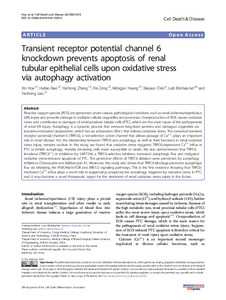Por favor, use este identificador para citar o enlazar este ítem:
https://repositorio.uca.edu.ar/handle/123456789/8686| Título: | Transient receptor potential channel 6 knockdown prevents apoptosis of renal tubular epithelial cells upon oxidative stress via autophagy activation | Autor: | Hou, Xin Xiao, Haitao Zhang, Yanhong Zeng, Xixi Huang, Mengjun Chen, Xiaoyun Birnbaumer, Lutz Liao, Yanhong |
Palabras clave: | RIÑON; ESTRES OXIDATIVO; APOPTOSIS; CELULAS EPITELIALES; INSUFICIENCIA RENAL | Fecha de publicación: | 2018 | Editorial: | Nature Publishing Group | Cita: | Hou X, Xiao H, Zhang Y, et al. Transient receptor potential channel 6 knockdown prevents apoptosis of renal tubular epithelial cells upon oxidative stress via autophagy activation. Cell Death & Disease. 2018;9(10):1-15. doi:10.1038/s41419-018-1052-5 Disponible en: https://repositorio.uca.edu.ar/handle/123456789/8686 | Resumen: | Abstract: Reactive oxygen species (ROS) are generated under various pathological conditions such as renal ischemia/reperfusion (I/R) injury and provoke damage to multiple cellular organelles and processes. Overproduction of ROS causes oxidative stress and contributes to damages of renal proximal tubular cells (PTC), which are the main cause of the pathogenesis of renal I/R injury. Autophagy is a dynamic process that removes long-lived proteins and damaged organelles via lysosome-mediated degradation, which has an antioxidant effect that relieves oxidative stress. The canonical transient receptor potential channel 6 (TRPC6), a nonselective cation channel that allows passage of Ca2+, plays an important role in renal disease. Yet, the relationship between TRPC6 and autophagy, as well as their functions in renal oxidative stress injury, remains unclear. In this study, we found that oxidative stress triggered TRPC6-dependent Ca2+ influx in PTC to inhibit autophagy, thereby rendering cells more susceptible to death. We also demonstrated that TRPC6 knockout (TRPC6-/-) or inhibition by SAR7334, a TRPC6-selective inhibitor, increased autophagic flux and mitigated oxidative stress-induced apoptosis of PTC. The protective effects of TRPC6 ablation were prevented by autophagy inhibitors Chloroquine and Bafilomycin A1. Moreover, this study also shows that TRPC6 blockage promotes autophagic flux via inhibiting the PI3K/Akt/mTOR and ERK1/2 signaling pathways. This is the first evidence showing that TRPC6-mediated Ca2+ influx plays a novel role in suppressing cytoprotective autophagy triggered by oxidative stress in PTC, and it may become a novel therapeutic target for the treatment of renal oxidative stress injury in the future. | URI: | https://repositorio.uca.edu.ar/handle/123456789/8686 | ISSN: | 2041-4889 | Disciplina: | MEDICINA | DOI: | 10.1038/s41419-018-1052-5 | Derechos: | Acceso Abierto | Fuente: | Cell Death & Disease. 2018;9(10):1-15 |
| Aparece en las colecciones: | Artículos |
Ficheros en este ítem:
| Fichero | Descripción | Tamaño | Formato | |
|---|---|---|---|---|
| transient-receptor-potential-channel.pdf | 2,23 MB | Adobe PDF |  Visualizar/Abrir |
Visualizaciones de página(s)
316
comprobado en 25-feb-2026
Descarga(s)
203
comprobado en 25-feb-2026
Google ScholarTM
Ver en Google Scholar
Altmetric
Altmetric
Este ítem está sujeto a una Licencia Creative Commons

